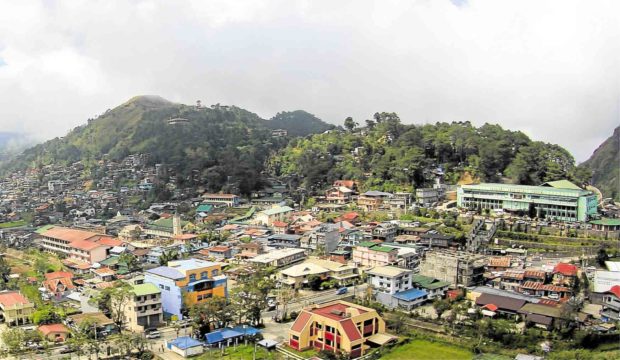Avoid urban decay, Baguio neighbors told

VALLEY RISING La Trinidad valley, the provincial capital and the business center of Benguet, has been confronting problems brought about by urbanization and congestion. —EV ESPIRITU
BAGUIO CITY, Benguet, Philippines — The carrying capacity of La Trinidad, Benguet province, and its four nearby towns has to be measured to ensure that they would not repeat mistakes made by Baguio City, which is reeling from “overloaded” public services and an unregulated construction boom.
Baguio, a tourism and educational center; La Trinidad, a vegetable trading hub; Itogon, a pioneer mining town; and Sablan, Tuba and Tublay, which are food producers, are part of an intergovernmental economic and resource sharing arrangement called BLISTT to spread out business investments in the Cordillera.
BLISTT is the acronym of Baguio and its neighboring towns La Trinidad, Itogon, Sablan, Tuba and Tublay, all in Benguet.
This cooperation initiative is Baguio’s “salvation” because channeling capital flow to the Benguet towns would decongest the city that is barely served by its natural and public resources, said Candido Cabrido, head of the research team commissioned to study its urban carrying capacity.
Carrying capacity is the extent by which members of a community share resources like its forests or water supply. Once the carrying capacity is breached, residents suffer from a deteriorated environment and overloaded infrastructure and public services, according to Cabrido’s consultancy group, Certeza Infosys, which disseminated the study’s final report last week.
Article continues after this advertisement‘Warning bells’
Article continues after this advertisementDescribed as the country’s first comprehensive carrying capacity study, the report provided timetables to set off “warning bells” when certain resources become inadequate for Baguio needs.
“Elevators have carrying capacities. [Each lift] can carry only a certain number of people. When occupants of the elevator exceed the mandated weight, it will trigger an alarm, so one of them will have to step out. This study sets the alarms for Baguio,” Cabrido said.
Some of Baguio’s alarm bells were set off decades ago, giving the city’s administrators an idea of how long reforms needed to catch up, he said.
Warning bells would have rung in 1985, for example, when Baguio roads exceeded their user threshold. The city’s road system, spanning 349 kilometers, supports 145,416 residents in an urban area populated by 345,366 as of the 2015 census.
BLISTT was popularized by retired city architect Joseph Alabanza in 1990, and was explored by European urban planners, geologists and engineers for the 1992 Baguio-Dagupan urban planning project, which found the rolling hills of Tuba and Itogon and vast open lands in nearby towns as suitable for new subdivisions and business centers.
Alabanza, who was Cordillera director of the National Economic and Development Authority at the time, advocated for Baguio’s decongestion.
Economic sharing
Aside from being the summer capital, the city draws migrants because it is the economic hub of the Cordillera being home to one of the oldest economic zones and some universities.
In 2012, BLISTT mayors signed a memorandum of understanding regarding the goals of the economic sharing initiative.
Baguio Rep. Marquez Go has sponsored a bill creating a BLISTT governing body similar to the Metropolitan Manila Development Authority. Baguio Mayor Benjamin Magalong chairs the BLISTT council of mayors.
Cabrido said BLISTT would solve Baguio’s key resource problems, like its potable water supply, that had been strained by its growing population.